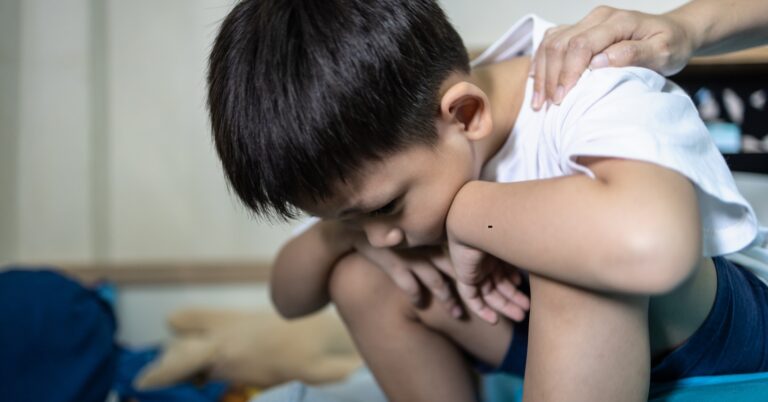Navigating through the labyrinth of childhood and adolescence is no easy feat, especially when faced with the daunting challenge of peer pressure.
As a parent, it can be difficult to discern if your child’s unusual behavior is just a part of growing up or if there’s something deeper going on. Is your child acting out simply because they’re trying to find their footing in the world, or are they facing the weighty pressure to fit in?
In the spirit of fostering understanding and open dialogue, I’ve delved into my experience as a parent and consulted professionals to compile a list of 8 signs that your child may be grappling with peer pressure. If these signs hit close to home, it may be an indication that your little one needs your guidance and support to navigate these choppy waters.
1. Academic performance shift
One of the most noticeable signs that your child could be facing peer pressure is a sudden shift in their academic performance.
Your child, who once came home beaming with pride over an A+ on a test, may start bringing home papers marked with red pen more often than not. Or perhaps your straight-A student has started neglecting homework assignments or appears disinterested in school altogether.
This sudden change could be a reflection of your child succumbing to the pressure of fitting in with their peers who might not value academics as much. It’s important to approach this situation with understanding and empathy, rather than outright disappointment or anger. This could be your opportunity to open a dialogue about the importance of individuality and personal growth.
2. Overemphasis on appearances
An unexpected sign that your child may be dealing with peer pressure is an exaggerated focus on their physical appearance.
You might notice your child spending excessive amounts of time in front of the mirror, fretting over their outfit for school, or suddenly expressing dissatisfaction with their physical features. While it’s perfectly normal for adolescents to become more aware of their appearance as they grow up, an obsessive behavior might indicate a deeper issue.
Counterintuitively, this isn’t always about vanity or self-obsession. It could be your child’s way of coping with the pressure to conform to their peers’ standards of beauty or style. As a parent, offering reassurance that true worth is not dictated by outward appearances, but rather by qualities such as kindness, intelligence, and integrity, is essential.
3. New friends, old friends forgotten
A sudden replacement of old friends with a new set of peers could be a sign of your child succumbing to peer pressure.
Childhood friendships can be incredibly strong, forged in the fires of shared experiences and mutual growth. So when your child’s circle shifts abruptly, it’s worth taking notice.
Your child might start preferring the company of these new friends who you know little about, while their long-time friends are suddenly out of the picture. This could indicate that your child is trying to fit into a different group, often under the influence of peer pressure.
While making new friends is a healthy part of growing up, completely abandoning old ones raises a red flag. Your child should strive for a balanced social life and avoid compromising their true self just to fit in.
4. Impulsive purchasing habits
An interesting point to consider is how peer pressure can manifest in your child’s spending habits.
You might notice your child suddenly desperate to own the latest phone, the trendiest pair of sneakers, or the most popular brand of clothing. This desire to own specific items isn’t always about materialism but can be driven by a need to fit in with their peers.
Many children often feel pressured to match their peers’ material possessions to fit in. It’s essential to discuss the value of money and differentiate between wants and needs. This helps them understand that true acceptance comes from demonstrating character and kindness, not from buying approval.
5. Unexplained anxiety or mood swings
One of the more subtle, yet deeply impactful signs of peer pressure is a sudden shift in your child’s emotional state.
At times, your vibrant and cheerful child might retreat into a shell, displaying signs of anxiety or unexplained mood swings. These changes in behavior can be confusing and heartbreaking to witness as a parent.
The pressure to fit in, to be liked, to not make mistakes can be enormously stressful for a child. This constant state of worry and fear of rejection can manifest as anxiety or drastic mood changes.
Creating a safe and non-judgmental space for them to express their feelings is essential. Remind them that it’s okay to feel vulnerable and that everyone, adults included, experiences moments of self-doubt and anxiety. Breaking down these emotional barriers can help them understand that they are not alone in this struggle.
6. Excessive use of social media
While it’s normal for today’s generation to be tech-savvy and connected online, a sudden spike in your child’s social media usage might be a red flag.
You might observe your child constantly scrolling through Instagram feeds, obsessively checking Snapchats, or spending hours perfecting a single post. While it may seem like harmless digital engagement on the surface, it could be a sign of peer pressure.
Surprisingly, this isn’t always about a digital addiction. Your child may feel the need to portray a certain image online to feel accepted by their peers. The pressure to get more likes, comments or followers can become an unhealthy obsession. It’s essential for parents to highlight the difference between online personas and real-life identities, reminding them that self-worth is not determined by social media popularity.
7. Increased secrecy
A common part of growing up involves children seeking to establish their privacy and independence. However, an abrupt increase in secretive behavior might be a sign of peer pressure.
Your usually open child has suddenly become tight-lipped about their day-to-day activities, or they’re spending an unusual amount of time alone or behind closed doors.
It’s an interesting fact that adolescents are more likely to engage in risky behavior when they’re with their peers compared to when they’re alone. This could be due to a desire to fit in, or the fear of being left out.
Increased secrecy could be a sign that your child is trying to conceal such behaviors, indicating that they might be succumbing to peer pressure.
Open and non-judgmental communication is key here. Make sure your child feels comfortable sharing their experiences with you, and assure them that they can always turn to you for guidance.
8. Loss of interest in hobbies
As your child grows and evolves, their interests are bound to change. However, if your child abruptly stops engaging in activities they once loved, it might be cause for concern.
Perhaps your child used to spend hours sketching, lost in their own world of colors and creativity, but now their sketchbook gathers dust. Or maybe they were passionate about playing the piano, but now the keys sit untouched. This sudden loss of interest could indicate that your child is under pressure to align their interests with those of their peers.
Everyone has unique passions and talents, and these differences are what make us special. They should pursue what genuinely interests them, disregarding others’ judgments of what is ‘cool’ or ‘uncool’.
Understanding the Impact of Peer Pressure
As we delve deeper into the intricacies of peer pressure, it’s essential to understand that it’s not just about identifying the signs. It’s also about understanding the profound impact it can have on your child’s mental and emotional well-being.
Peer pressure can feel like a relentless, invisible force that pushes your child into a mold that doesn’t quite fit them. It can make them question their worth if they don’t match up to perceived standards. It can push them into making choices they’re not comfortable with or ready for, just for the sake of acceptance.
This isn’t merely being part of the ‘in’ crowd or owning the latest gadgets. It’s your child grappling with their sense of identity, trying to figure out who they are while being constantly bombarded with who they ‘should’ be. It’s them navigating through this complex web of expectations, judgments, and comparisons, often leading to stress, anxiety, and low self-esteem.
But it’s important to remember that peer pressure isn’t always negative. In some cases, it can encourage positive behavior like performing well academically or engaging in community service. The key lies in how we, as parents, guide our children through these experiences.
Help your child understand that everyone has their unique journey and timeline in life. Reinforce the idea that it’s okay to stand apart from the crowd if it means staying true to themselves. Encourage open conversations about their fears and insecurities related to fitting in.
Remind them that popularity is ephemeral but personal growth is enduring. Help them build resilience against negative influences and empower them to make decisions based on their values rather than external pressure.









